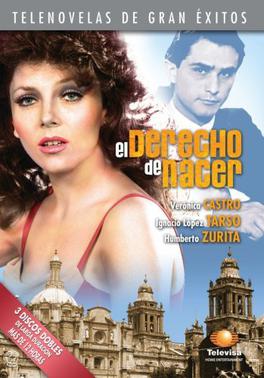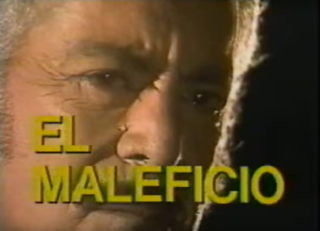
María Victoria Eugenia Guadalupe Martínez del Río Moreno-Ruffo better known as Victoria Ruffo is a Mexican actress notable for her roles in telenovelas.

El derecho de nacer is a Mexican telenovela produced by Ernesto Alonso for Televisa in 1981. Based on the Cuban radionovela of the same name written by Félix B. Caignet adapted for TV by Fernanda Villeli and directed by Raúl Araiza.

Quinceañera is a Mexican telenovela produced by Carla Estrada for Televisa in 1987. Quinceañera was the first telenovela to talk about substance abuse, date rape and gangs, and is considered to be the first telenovela made in Mexico for teenagers.

Azela Robinson is a British Mexican actress. She has portrayed antagonistic characters in the Mexican telenovelas Cañaveral de pasiones (1996), Contra viento y marea (2005), Llena de amor (2010) and Yo no creo en los hombres (2014).

Salomé is a Mexican telenovela produced by Juan Osorio for Televisa in 2001. It is the third remake of La Colorina.

La Otra is a Mexican telenovela produced by Ernesto Alonso for Televisa in 2002. It aired on Canal de las Estrellas from May 20 to September 20, 2002. The telenovela stars Juan Soler, Yadhira Carrillo, Jacqueline Andere and Sergio Sendel.

El derecho de nacer is a Mexican telenovela produced by Carlos Sotomayor for Televisa. It aired on Canal de las Estrellas from February 5, 2001 to May 25, 2001. It is a remake of the popular 1981 telenovela of the same name.
La antorcha encendida is a Mexican telenovela produced by Ernesto Alonso and Carlos Sotomayor for Televisa in 1996. It was the last historical telenovela produced by Televisa. The plot tells the Independence of Mexico, with an emphasis on historical accuracy. It was written by Fausto Zeron Medina in collaboration with Liliana Abud. It premiered on Canal de las Estrellas on May 6, 1996, and ended on November 15, 1996.

El maleficio is a Mexican telenovela directed by Raúl Araiza produced by Ernesto Alonso for Televisa in 1983. The telenovela was so successful in 1983 that a sequel was made under the title of El maleficio 2: Los enviados del infierno in 1986.
En busca del paraíso is a Mexican telenovela produced by Ernesto Alonso for the broadband Televisa in 1982. It starred by Maricruz Olivier, Victoria Ruffo, Juan Luis Galiardo, David Reynoso, Miguel Angel Ferriz and Carlos Bracho.

La Fiera is a Mexican telenovela produced by Valentín Pimstein for Televisa in 1983.
La traición is a Mexican telenovela produced by Ernesto Alonso and directed by Raúl Araiza for Televisa in 1984.
Lo blanco y lo negro is a Mexican telenovela produced by Ernesto Alonso for Televisa in 1989.
Pobre juventud is a Mexican telenovela produced by Carla Estrada for Televisa in 1986. It is from an original story by Félix B. Caignet, adapted by Marcia del Río and directed by Pedro Damián.
El vuelo del águila is a Mexican telenovela produced by Ernesto Alonso and Carlos Sotomayor for Televisa in 1994–1995. Telenovela based on the Mexican soldier and President of Mexico Porfirio Díaz, from his name had come out the title "Época Porfiriana" or "Porfiriato" during the period of his rule, in the years 1876–1911.
Prisionera de amor is a Mexican telenovela produced by Pedro Damián for Televisa in 1994.
María José is a Mexican telenovela produced by Juan Osorio for Televisa in 1995.
Desencuentro is a Mexican telenovela produced by Ernesto Alonso for Televisa in 1997.
Salud, dinero y amor is a Mexican telenovela produced by Emilio Larrosa for Televisa in 1997–1998. Is a sequel of 1995 Mexican telenovela El premio mayor.
The 20th TVyNovelas Awards were an academy of special awards to the best soap operas and TV shows. The awards ceremony took place on July 4, 2002, in Mexico D.F. The ceremony was televised in Mexico by El canal de las estrellas.









